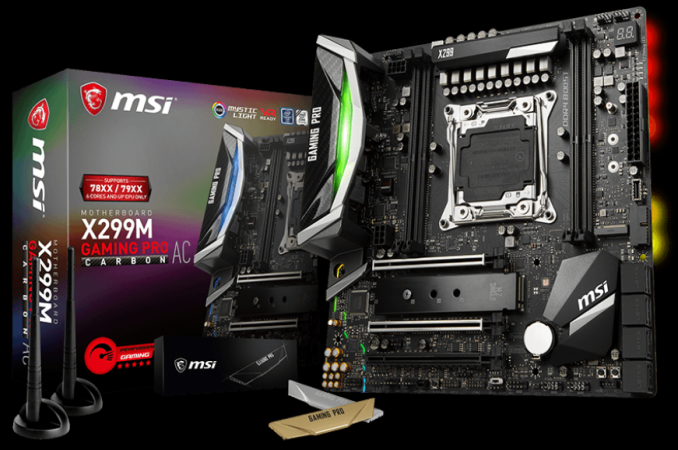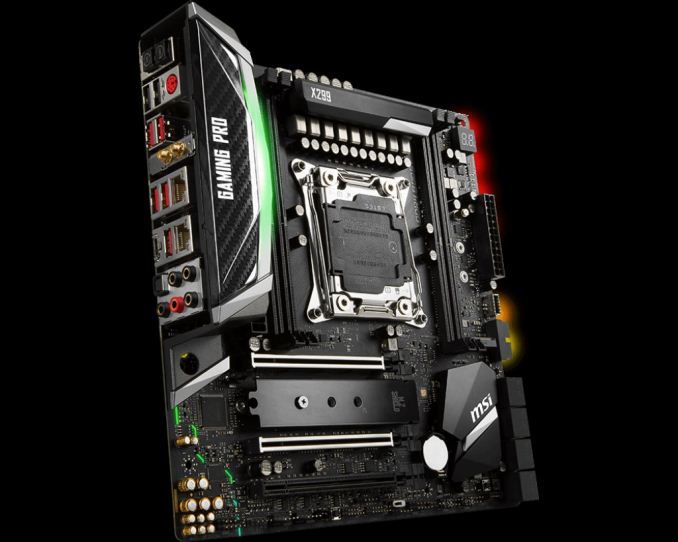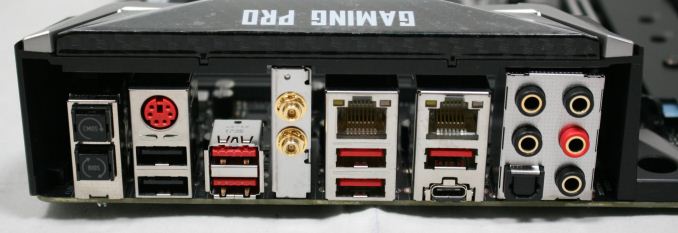The MSI X299M Gaming Pro Carbon AC Motherboard Review
by Joe Shields on March 22, 2018 9:00 AM EST- Posted in
- Motherboards
- MSI
- MicroATX
- X299
- Basin Falls
- Skylake-X
- Gaming Pro Carbon

There are only a few options in the microATX market if you want all the Intel cores but want to remain small and compact. The challenger today is MSI's X299M Gaming Pro Carbon AC, which leverages the 'Carbon' branding from MSI to offer a cleaner look, although there are LEDs on board just in case. Due to the size there are some considerations to feature support that are worth examining.
MSI X299M Gaming Pro Carbon AC Overview
Motherboards are ultimately designed to appeal to the market that offers a peak return for the motherboard manufacturers, both for cost and unit sales. The design of that appeal comes down to feature set, intended market, style, accessories, and with any luck, a clear execution. MSI's Gaming Pro Carbon range has been at the front of the company's recent push to appeal to the high-end enthusiast that wants a clean look, a strong feature list, but also the ability to bling it up when they want to show off the system. Beauty, they say, is in the eye of the beholder, so we ran it through our system level tests to see if the system shines under the hood. The base quality of motherboards in 2018 means that there has to be significant substance underneath the style.
Overall, the performance testing went quite well. The X299M Gaming Pro Carbon AC performs close to the larger ATX models, but for one reason or another the aggressive multi-core enhancements (MCE) we saw on when testing their other boards did not make it down here. With that, the power consumption of the X299M was in line with many of the other boards that are not as aggressive on the MCE tweaks. Boot times were on the slower side of things compared to the rest of the boards, but it was on par with the two other MSI boards which we have tested. Overclocking results were also the same, topping out at 4.6 GHz and being temperature limited.
On the feature front, the most obvious visual is that this motherboard only has support for one memory module per channel, limiting the total memory to 64 GB. Aside from the one disadvantage of a reduction in peak capacity, this usually affords benefits by making tracing easier and supporting higher speed memory (when overclocking). Another feature not so obvious is that this motherboard is listed to only support Skylake-X processors, and not the quad-core Kaby Lake-X processors. This is also likely to make the design easier, especially when dealing with PCIe lanes for storage and physical PCIe slots.
The MicroATX Gaming Pro Carbon AC gives users nearly all options for storage connectivity - it has two M.2 slots which share some of the bandwidth from the eight SATA ports. For the three PCIe slots, all three are connected to the CPU. So while all three can be used for video cards, the reinforced slots are the primary GPU slots. For connectivity, on the back panel we can see support up to USB 3.1, as well as Type-C, as well as the Intel 8265 Wi-Fi, dual Intel NICs, and a Realtek ALC1220 audio codec.
The X299M Gaming Pro Carbon AC is currently priced at $293 from Newegg and $305 from Amazon. Its only direct competitor, the EVGA X299 Micro is, priced at $290 on Newegg. A quick glance here between these two has the MSI board with more available SATA ports, a higher-end audio codec, and more going for it.
MSI X299 Strategy
MSI's X299 XPower Gaming AC holds the current flagship position of MSI's range, and makes its home in the Enthusiast Gaming segment along with the X299 Gaming M7 ACK. At present there are a total of three boards in the Performance Gaming hierarchy, with the Arsenal line that carries the Tomahawk boards. MSI has the standard Pro lineup for more cost-effective options that have slightly fewer features.
| MSI's X299 Motherboard Lineup (11/29) | |||
| AnandTech Review |
Amazon | Newegg | |
| X299 XPower Gaming AC | [review planned] | $450 | $450 |
| X299 Gaming M7 ACK | [review planned] | $366 | $380 |
| X299 Gaming Pro Carbon AC | Review 9/21 | $273^ | $330 |
| X299 Gaming Pro Carbon | $320 | $320 | |
| X299M Gaming Pro Carbon AC | [this review] | $277 | $290 |
| X299 Tomahawk AC | $273 | $290 | |
| X299 Tomahawk Arctic | Review 11/20 | $280 | $280 |
| X299 Tomahawk | $256 | $270 | |
| X299 SLI PLUS | Review 11/29 | $232 | $220 |
| X299 Raider | $215 | $220 | |
| X299M-A Pro | - | $237^ | |
^ Third Party Sellers
The X299M Gaming Pro Carbon AC is one of two microATX boards within MSI's lineup. The other, the X299M-A Pro, is a bit further down the product stack. MSI is the only OEM that has two MicroATX boards, while some have nothing smaller than ATX (Gigabyte and ASUS). ASRock, on the other hand, offers one - a feature-laden Mini-ITX board, the X299E-ITX/ac. This means that the X299M Gaming Pro Carbon AC has only one direct competitor, the EVGA X299 Micro, which we reviewed here.
The big differences between the two MSI microATX offerings really comes down to a few things. First, the X299M-A Pro supports Kaby Lake-X CPUs only. Outside of that, the only major differences have to do with USB 3.1 (10 Gbps) support and the network. Pricing on the X299M-A Pro reflects these differences and comes in around $207 at Newegg.
The X299M Gaming Pro Carbon AC, on the other hand, is able to support only Skylake-X CPUs. With that, it offers quad channel RAM through its four DIMM slots. USB 3.1 (10 Gbps) support for the front panel is found here along with dual Intel NICs and integrated Wi-Fi. This board also has integrated RGB LEDs while the X299-A Pro does not. The additional features do come with a higher price being sold for around $280 at Newegg.
Information on Intel's X299 and our other Reviews
With Intel's release of the Basin Falls platform, encompassing the new X299 chipset and LGA2066 socket, a new generation of CPUs called Skylake-X and Kaby Lake-X were also released. The Skylake-X CPUs range from the 7800X, a hex-core part, all the way up to an 18-core 7980XE multitasking behemoth. Between the bookend CPUs are five others increasing in core count, as in the table below. The latter HCC models are set to be launched over 2H of 2017.
| Skylake-X Processors | ||||||||
| 7800X | 7820X | 7900X | 7920X | 7940X | 7960X | 7980XE | ||
| Silicon | LCC | HCC | ||||||
| Cores / Threads | 6/12 | 8/16 | 10/20 | 12/24 | 14/28 | 16/32 | 18/36 | |
| Base Clock / GHz | 3.5 | 3.6 | 3.3 | 2.9 | 3.1 | 2.8 | 2.6 | |
| Turbo Clock / GHz | 4.0 | 4.3 | 4.3 | 4.3 | 4.3 | 4.3 | 4.2 | |
| Turbo Max Clock | N/A | 4.5 | 4.5 | 4.4 | 4.4 | 4.4 | 4.4 | |
| L3 | 1.375 MB/core | 1.375 MB/core | ||||||
| PCIe Lanes | 28 | 44 | 44 | |||||
| Memory Channels | 4 | 4 | ||||||
| Memory Freq DDR4 | 2400 | 2666 | 2666 | |||||
| TDP | 140W | 140W | 165W | |||||
| Price | $389 | $599 | $999 | $1199 | $1399 | $1699 | $1999 | |
Board partners have launched dozens of motherboards on this platform already, several of which we will have an opportunity to look over in the coming weeks and months.
Other AnandTech Reviews for Intel’s Basin Falls CPUs and X299
- The Intel Skylake-X Review: Core i9-7980XE and Core i9-7960X Tested
- The Intel Skylake-X Review: Core i9-7900X, i7-7820X and i7-7800X Tested
- The Intel Kaby Lake-X Review: Core i7-7740X and i5-7640X Tested
- Intel Announces Basin Falls: The New High-End Desktop Platform and X299 Chipset
- ($480) The ASUS Prime X299-Deluxe Review [link]
- ($400) The GIGABYTE X299 Gaming 7 Pro Review [link]
- ($390) The ASRock X299E-ITX/ac Review [link]
- ($390) The ASRock X299 Professional Gaming i9 Review [link]
- ($370) The ASUS Strix X299-XE Gaming Review [link]
- ($366) The MSI X299 Gaming M7 ACK Review [link]
- ($308) The MSI X299 Gaming Pro Carbon Review [link]
- ($340) The ASUS X299 TUF Mark 1 Review [link]
- ($330) The EVGA X299 FTW-K Review [link]
- ($305) The MSI X299M Gaming Pro Carbon AC (this review)
- ($290) The EVGA X299 Micro Review [link]
- ($290) The ASRock X299 Taichi Review [link]
- ($260) The MSI X299 Tomahawk Arctic Review [link]
- ($232) The MSI X299 SLI Plus Review [link]
To read specifically about the X299 chip/platform and the specifications therein, our deep dive into what it is can be found at this link.
X299 Motherboard Review Notice
If you’ve been following the minutiae of the saga of X299 motherboards, you might have heard some issues regarding power delivery, overclocking, and the ability to cool these processors down given the power consumption. In a nutshell, it comes down to this:
- Skylake-X consumes a lot of power at peak (150W+),
- The thermal interface inside the CPU doesn’t do much requiring a powerful CPU cooler,
- Some motherboard vendors apply Multi-Core Turbo which raises the power consumption and voltage, exacerbating the issue
- The VRMs have to deal with more power, and due to losses, raise in temperature
- Some motherboards do not have sufficient VRM cooling without an active cooler
- This causes the CPU to declock or hit thermal power states as to not degrade components
- This causes a performance drop, and overclocked systems are affected even more than usual
There has been some excellent work done by Igor Wallossek over at Tom’s Hardware, with thermal probes, thermal cameras, and performance analysis. The bottom line is that motherboard vendors need to be careful when it comes to default settings (if MCT is enabled by default) and provide sufficient VRM cooling in all scenarios – either larger and heavier heatsinks or moving back to active cooling.












14 Comments
View All Comments
eek2121 - Thursday, March 22, 2018 - link
You guys should pay closer attention to the quality of MSI motherboards. Especially how buggy their UEFI/BIOS is. For instance, 6 BIOS releases in a row on my x399 had bugs like overclocking values not saving unless you hit enter, broken fan profiles that didn't work, etc.halcyon - Friday, March 23, 2018 - link
Agreed. Have a Z370 MSi board and the UEFI/BIOS is a far cry from Asus or Asrock...Joe Shields - Tuesday, March 27, 2018 - link
I can only report on what I tested and my experiences in testing them. I did not experience any of those issues in my testing time.hansmuff - Thursday, March 22, 2018 - link
Thank you for pointing out the terrible heatsink. In this price class, IMHO that makes it a no-go.gammaray - Thursday, March 22, 2018 - link
is there a point in buying that platform when the 8700k is king of gaming?mkaibear - Friday, March 23, 2018 - link
There are plenty of points in buying that platform. It makes for excellent workstations, the added parallelism over an 8700K makes it worthwhile if you're doing anything reasonably threaded but requiring decent single-core performance as well.Of course Threadripper has taken a chunk of the workstation space higher up, so there's less of a point than there was when it was launched, but not everyone only does gaming on their system.
(also if you are using a system for content creation or compiling at home, and you need a large number of cores but still want a system which will have decent performance in the latest games, there's a use case in there too)
But yes, if you want a pure gaming system then you'd go for one of the core iX-8x00s.
(I wouldn't go for an 8700k purely for gaming to be honest, I'd go for an i5-8400 probably and spend the extra money on a better graphics card)
PeachNCream - Friday, March 23, 2018 - link
MSI is marketing this motherboard for gaming which is explained in the product name X299M Gaming Pro Carbon AC. It makes the question being asked a valid one.mkaibear - Friday, March 23, 2018 - link
I didn't question the validity of the question. I merely answered it!My Angle - Thursday, March 22, 2018 - link
Thanks for sharing the informative information through the article. and all the details are awesome and good in this post.http://ludokinggames.com
MDD1963 - Friday, March 23, 2018 - link
Would there be some advantage paying about $600-$800 extra for an X299/7900X- based gaming system over a Z370/8700K system? For gaming? Only thing even more silly is TR4/1950X....